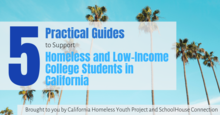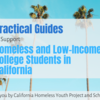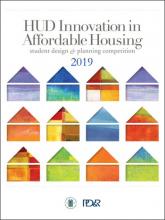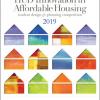0
Interactive
Community:
Through our conversations with King County, Seattle, Tacoma, and Vancouver Housing Authorities, as well as Home Forward, Portland’s housing authority, and partners from school districts, out-of-school time programs, and community-based organizations, we learned why they endeavored to better intersect housing and education, elements of a successful partnership, lessons learned, their challenges, and how the work can be replicated. We hope this will be a resource for other individuals and communities as they begin and strengthen partnerships of their own in order to improve life outcomes for low-income individuals and families.
Authored by: CLPHA
Topics: CLPHA, Education, Housing, Out-of-school time, Partnerships, Place-based
 Shared by Mica O'Brien
Shared by Mica O'Brien
Mica O'Brien posted a
on Dec 20, 2018
Through our conversations with King County, Seattle, Tacoma, and Vancouver Housing Authorities, as well as Home Forward, Portland’s housing authority, and partners from school districts, out-of-school time programs, and community-based organizations, we learned why they endeavored to better intersec
0
Interactive
Community:
Long-term, sustainable financing is a major challenge for the majority of multisector partnerships, and the organizations aligned with them, in regions across the country. Many depend overwhelmingly on short-term sources of funding—namely, grants. It’s time to explore new financing frontiers!
Authored by: ReThink Health: A Rippel Initiative
Topics: Funding, Partnerships
 Shared by Housing Is
Shared by Housing Is
Housing Is posted a
on Dec 17, 2018
ReThink Health: A Rippel Initiative
Long-term, sustainable financing is a major challenge for the majority of multisector partnerships, and the organizations aligned with them, in regions across the country. Many depend overwhelmingly on short-term sources of funding—namely, grants. It’s time to explore new financing frontiers!
0
Podcast
Community:
Karis Grounds, MPH, Vice President of Health and Community Impact at 2-1-1 San Diego, joined the podcast to discuss how she is supporting the strategic development of San Diego’s community information exchange (CIE), a technology platform that is enabling data sharing and collaboration between health and social service providers to deliver person-centered care and improve health equity. Grounds shared strategies for aligning multi-sector partners around a shared language and an integrated technology platform to deliver enhanced care coordination. She also discussed how 2-1-1 San Diego is spreading its impact by sharing practical tools to help other communities make progress towards implementing a community information exchange.
Authored by: All In: Data for Community Health
Topics: Data sharing, Health, Partnerships
 Shared by Mica O'Brien
Shared by Mica O'Brien
Mica O'Brien posted a
on Dec 17, 2018
All In: Data for Community Health
Karis Grounds, MPH, Vice President of Health and Community Impact at 2-1-1 San Diego, joined the podcast to discuss how she is supporting the strategic development of San Diego’s community information exchange (CIE), a technology platform that is enabling data sharing and collaboration between healt
0
Podcast
Community:
Leah Hendey, MPP, Senior Research Associate at the Urban Institute, joined the podcast to reflect on her experiences co-directing the National Neighborhood Indicators Partnership (NNIP), a nationwide effort to advance the use of neighborhood-level data to drive local decision-making. NNIP is led by the Urban Institute and a network of 32 partners representing local data intermediaries across the country. Hendey discussed the role local data intermediaries play in their communities, explained how neighborhood-level data can be used to understand and address issues of health equity, and shared examples of communities that have successfully used neighborhood information systems in innovative ways to solve pressing public health challenges.
Authored by: All In: Data for Community Health
Topics: Community development, Data sharing, Health, Partnerships, Place-based
 Shared by Mica O'Brien
Shared by Mica O'Brien
Mica O'Brien posted a
on Dec 17, 2018
All In: Data for Community Health
Leah Hendey, MPP, Senior Research Associate at the Urban Institute, joined the podcast to reflect on her experiences co-directing the National Neighborhood Indicators Partnership (NNIP), a nationwide effort to advance the use of neighborhood-level data to drive local decision-making.
0
Interactive
Community:
Dec 12, 2018
Using the story of Lily, a resilient, hopeful Muppet whose family is experiencing homelessness, Sesame Street developed a set of free, bilingual resources for children and families experiencing homelessness and the providers who serve them. Many different kinds of providers serve children experiencing homelessness, including school district homeless liaisons, early childhood programs, and homeless assistance and housing programs. To help these providers quickly and effectively leverage Sesame Street’s resources in the context of their specific work, SchoolHouse Connection has produced tip sheets organized by provider role.
Authored by: SchoolHouse Connection
Topics: Child welfare, Education, Homelessness, Housing, Low-income
 Shared by Mica O'Brien
Shared by Mica O'Brien
Mica O'Brien posted a
on Dec 12, 2018
Using the story of Lily, a resilient, hopeful Muppet whose family is experiencing homelessness, Sesame Street developed a set of free, bilingual resources for children and families experiencing homelessness and the providers who serve them.
0
Interactive
Community:
Activities and videos about homelessness for children and families
Authored by: Sesame Street
Topics: Education, Homelessness, Housing, Low-income
 Shared by Mica O'Brien
Shared by Mica O'Brien
Mica O'Brien posted a
on Dec 12, 2018
Activities and videos about homelessness for children and families
0
Interactive
Community:
Nov 15, 2018
In an equitable DC, every resident would have the opportunity to prosper. But decades of discriminatory policies and practices have created inequities by ward, neighborhood, and race and ethnicity. Public, private, and nonprofit interventions have narrowed these gaps, but more needs to be done to level the playing field. This tool shows what it would take to improve equity across wards and neighborhoods on 16 key indicators. Select different areas of the District to compare or set your own goals for equity.
Authored by: The Urban Institute
Topics: Community development, East Coast, Education, Mobility, Place-based, Post-secondary, Racial inequalities, Research
 Shared by Mica O'Brien
Shared by Mica O'Brien
Mica O'Brien posted a
on Dec 6, 2018
In an equitable DC, every resident would have the opportunity to prosper. But decades of discriminatory policies and practices have created inequities by ward, neighborhood, and race and ethnicity.
0
Podcast
Community:
Why does it seem as if poverty is segregated to certain neighborhoods? What’s the secret to addressing the root of intergenerational poverty? How can we bring in new investment while preserving the history and culture of a place? Join us to explore these questions and more.
Authored by: Purpose Built Communities
Topics: Community development, Education, Health, Housing, Low-income, Mobility, Place-based, Racial inequalities, Research
 Shared by Mica O'Brien
Shared by Mica O'Brien
Mica O'Brien posted a
on Dec 5, 2018
Purpose Built Communities
Why does it seem as if poverty is segregated to certain neighborhoods? What’s the secret to addressing the root of intergenerational poverty? How can we bring in new investment while preserving the history and culture of a place? Join us to explore these questions and more.
0
Interactive
Community:
The 2018 Purpose Built Conference in Orlando, Florida from October 24 – 26 was a tremendous opportunity for thoughtful engagement and energetic conversations with Network Members and attendees from all across the country. Our panel of guest speakers represented a wide range of industries and brought unique perspectives and insights.
Authored by: Purpose Built Communities
Topics: Community development, Education, Health, Housing, Low-income, Mobility, Partnerships, Place-based
 Shared by Mica O'Brien
Shared by Mica O'Brien
Mica O'Brien posted a
on Dec 5, 2018
Purpose Built Communities
The 2018 Purpose Built Conference in Orlando, Florida from October 24 – 26 was a tremendous opportunity for thoughtful engagement and energetic conversations with Network Members and attendees from all across the country.
0
Interactive
Community:
People living just a few blocks apart may have vastly different opportunities to live a long life in part because of their neighborhood. Unfortunately, significant gaps in life expectancy at birth persist across many United States cities, towns, ZIP codes and neighborhoods. The latest estimates of life expectancy at birth reveals differences down to the census tract level. Explore how life expectancy in America compares with life expectancy in your area, and resources to help everyone have the opportunity to live a longer, healthier life.
Authored by: Robert Wood Johnson Foundation
Topics: Health, Housing, Low-income, Place-based, Research
 Shared by Mica O'Brien
Shared by Mica O'Brien
Mica O'Brien posted a
on Dec 5, 2018
Robert Wood Johnson Foundation
People living just a few blocks apart may have vastly different opportunities to live a long life in part because of their neighborhood. Unfortunately, significant gaps in life expectancy at birth persist across many United States cities, towns, ZIP codes and neighborhoods.
0
Interactive
Community:
Nov 29, 2018
With political divisions on the rise and global cooperation imperiled, city officials worldwide are stepping up to lead, solving local problems while sharing solutions and innovations across borders. Making cities such as New York, Pittsburgh, and Los Angeles inclusive, safe, and sustainable is vital to the future of the United States—and the globe. Driven by the need to act locally while thinking globally, a growing number of metro areas are adapting the Sustainable Development Goals (SDGs) as a blueprint for progress.
Authored by: The Brookings Institution
Topics: Community development, Housing, Partnerships, Place-based, Sustainability
 Shared by Mica O'Brien
Shared by Mica O'Brien
Mica O'Brien posted a
on Dec 3, 2018
The Brookings Institution
With political divisions on the rise and global cooperation imperiled, city officials worldwide are stepping up to lead, solving local problems while sharing solutions and innovations across borders.
0
Podcast
Community:
How should policymakers address the long-standing youth unemployment problem in Puerto Rico, which only worsened in the wake of Hurricanes Irma and Maria? After natural disasters, the government tends to focus its recovery efforts on infrastructure repairs and mental health services. But employment and economic security are equally important. With support from the W. T. Grant Foundation, MDRC partnered with Instituto del Desarrollo de la Juventud, or the Youth Development Institute, to develop recommendations that can create pathways into the workforce for young people and that are supported by evidence-based and promising practices relevant to the current situation in Puerto Rico.
Join Katie Beal as she talks to John Martinez, Director of Program Development at MDRC, about the recommendations we made to facilitate and support training and employment opportunities for young people in Puerto Rico, and the challenges of implementing those recommendations.
Authored by: MDRC
Topics: Low-income, Research, Workforce development, Youth
 Shared by Mica O'Brien
Shared by Mica O'Brien
Mica O'Brien posted a
on Nov 19, 2018
How should policymakers address the long-standing youth unemployment problem in Puerto Rico, which only worsened in the wake of Hurricanes Irma and Maria? After natural disasters, the government tends to focus its recovery efforts on infrastructure repairs and mental health services.
0
Interactive
Community:
Resources for integrating resiliency, hope, and wellness in schools
Authored by: Treatment and Services Adaptation Center
Topics: Child welfare, Low-income, Partnerships, Place-based, Research, Safety
 Shared by Mica O'Brien
Shared by Mica O'Brien
Mica O'Brien posted a
on Nov 19, 2018
Treatment and Services Adaptation Center
Resources for integrating resiliency, hope, and wellness in schools
0
Interactive
Community:
Nov 13, 2018
The California Homeless Youth Project and SchoolHouse Connection are proud to announce a series of five practical guides to support homeless and low-income college students in California. These series provide concise overviews of the five greatest needs of students experiencing homelessness.
Authored by: SchoolHouse Connection
Topics: Homelessness, Housing, Low-income, Post-secondary, West Coast, Youth
 Shared by Mica O'Brien
Shared by Mica O'Brien
Mica O'Brien posted a
on Nov 19, 2018
The California Homeless Youth Project and SchoolHouse Connection are proud to announce a series of five practical guides to support homeless and low-income college students in California. These series provide concise overviews of the five greatest needs of students experiencing homelessness.
0
Interactive
Community:
Nov 14, 2018
After decades of sprawl and suburban dominance, U.S. cities are experiencing rebounding populations, growing employment, and new public and private sector investments in places that are walkable, transit-oriented, and support diverse people and amenities. But we know that the benefits of these trends are not equally distributed, presenting an urgent opportunity for local and regional leaders to advance place-led development that produces better economic outcomes for more people in more places.
To help deliver on that imperative, the Metropolitan Policy Program at Brookings launched the Anne T. and Robert M. Bass Center for Transformative Placemaking (“Bass Center”) with an event on Wednesday, November 14. In collaboration with Project for Public Spaces (PPS) and the National Main Street Center (NMSC), the Bass Center will inspire public, private, and civic sector leaders to make transformative place investments that generate widespread social and economic benefits. Brookings President John Allen, Bass Center Director and Senior Fellow Jennifer Vey, special guest speaker Carol Coletta, and a distinguished panel of experts discussed how market and demographic trends are driving new demands for placemaking that benefit more people and places.
Authored by: The Brookings Institution
Topics: Community development, Housing, Partnerships, Place-based, Safety, Stability
 Shared by Mica O'Brien
Shared by Mica O'Brien
Mica O'Brien posted a
on Nov 19, 2018
The Brookings Institution
After decades of sprawl and suburban dominance, U.S. cities are experiencing rebounding populations, growing employment, and new public and private sector investments in places that are walkable, transit-oriented, and support diverse people and amenities.
0
Interactive
Community:
Aug 31, 2018
Over the past decade, chronic absence has gone from being a virtually unknown concept to a national education metric that provides every school in the nation with critical data on how many students are missing so many days of school it jeopardizes their academic success. The Hamilton Project at the Brookings Institution has created this interactive map using national data reported by school districts to the U.S. Department of Education Office for Civil Rights from the 2015-16 school year to allow anyone to explore rates of chronic absence at the school, district, state, and national levels by student and school characteristics. This interactive map accompanies an Attendance Works report, Data Matters: Using Chronic Absence to Accelerate Action for Student Success by Hedy Chang, Lauren Bauer, and Vaughan Byrnes.
Authored by: The Hamilton Project and The Brookings Institution
Topics: Attendance, Education, Metrics, Racial inequalities, Research
 Shared by Mica O'Brien
Shared by Mica O'Brien
Mica O'Brien posted a
on Nov 16, 2018
The Hamilton Project and The Brookings Institution
Over the past decade, chronic absence has gone from being a virtually unknown concept to a national education metric that provides every school in the nation with critical data on how many students are missing so many days of school it jeopardizes their academic success.
0
Podcast
Community:
Nov 9, 2018
Aaron Freiwald, Managing Partner of Freiwald Law and host of the weekly podcast, Good Law | Bad Law, is joined by Vicki Been, the Boxer Family Professor of Law at NYU, to discuss the Fair Housing Act on this historic civil rights legislation’s 50th birthday. The FHA was signed by President Lyndon Johnson in the days following the assassination of Dr. Martin Luther King Jr.
Authored by: Good Law/Bad Law Podcast
Topics: Housing, Legislation & Policy, Racial inequalities, Research
 Shared by Mica O'Brien
Shared by Mica O'Brien
Mica O'Brien posted a
on Nov 14, 2018
Aaron Freiwald, Managing Partner of Freiwald Law and host of the weekly podcast, Good Law | Bad Law, is joined by Vicki Been, the Boxer Family Professor of Law at NYU, to discuss the Fair Housing Act on this historic civil rights legislation’s 50th birthday.
0
Podcast
Community:
Josie Williams, Project Coordinator at the Greensboro Housing Coalition, joined the podcast to discuss a BUILD-funded project called “Collaborative Cottage Grove” that is fostering resident-led efforts to improve poor housing conditions that are leading to asthma-related emergency department visits in the Cottage Grove neighborhood of Greensboro, NC. Motivated by a desire to improve conditions in neighborhoods similar to the one she grew up in, and guided by resident voices, Williams is working with multi-sector partners to map asthma hospital visits and housing condition data to identify areas in need of support. The collaborative is also in the process of developing an electronic referral system to link families with asthma education and housing assessments.
Authored by: All In: Data for Community Health
Topics: Asthma, Data sharing, Health, Housing, Partnerships
 Shared by Mica O'Brien
Shared by Mica O'Brien
Mica O'Brien posted a
on Nov 8, 2018
All In: Data for Community Health
Josie Williams, Project Coordinator at the Greensboro Housing Coalition, joined the podcast to discuss a BUILD-funded project called “Collaborative Cottage Grove” that is fostering resident-led efforts to improve poor housing conditions that are leading to asthma-related emergency department visits
0
Interactive
Community:
Nov 5, 2018
Content for this app was developed specifically for middle schoolers and educates them on the principles of a healthy home in a preteen-friendly format. Navigation is simple and intuitive. Interactive features include the Train the Brain and the ability to save a list of items found in their home. Colorful graphics highlight many different hazards that can occur in homes, such as lead, mold and moisture, pests, and more.
Authored by: HUD
Topics: Child welfare, Health, Healthy homes, Housing, Lead, Low-income, Place-based, Safety, Youth
 Shared by Mica O'Brien
Shared by Mica O'Brien
Mica O'Brien posted a
on Nov 5, 2018
Content for this app was developed specifically for middle schoolers and educates them on the principles of a healthy home in a preteen-friendly format. Navigation is simple and intuitive. Interactive features include the Train the Brain and the ability to save a list of items found in their home.
0
Interactive
Community:
Oct 26, 2018
Percent of Families with Children Eligible for Shelter Due to Domestic Violence, by Community District (July 2014–December 2015)
Authored by: Institute for Children, Poverty, and Homelessness
Topics: Child welfare, Domestic violence, East Coast, Homelessness, Housing, Low-income, Research, Safety
 Shared by Mica O'Brien
Shared by Mica O'Brien
Mica O'Brien posted a
on Oct 29, 2018
Institute for Children, Poverty, and Homelessness
Percent of Families with Children Eligible for Shelter Due to Domestic Violence, by Community District (July 2014–December 2015)
0
Interactive
Community:
Oct 16, 2018
Based on civil rights data released by the U.S. Department of Education, ProPublica has built an interactive database to examine racial disparities in educational opportunities and school discipline. Look up more than 96,000 individual public and charter schools and 17,000 districts to see how they compare with their counterparts.
Authored by: Lena V. Groeger, Annie Waldman, and David Eads for ProPublica
Topics: Education, Racial inequalities, Research, Youth
 Shared by Mica O'Brien
Shared by Mica O'Brien
Mica O'Brien posted a
on Oct 25, 2018
Lena V. Groeger, Annie Waldman, and David Eads for ProPublica
Based on civil rights data released by the U.S. Department of Education, ProPublica has built an interactive database to examine racial disparities in educational opportunities and school discipline.
0
Interactive
Community:
Oct 24, 2018
The Opportunity Zone Fund Directory is a list of current Opportunity Zone funding opportunities compiled by the National Coalition of State Housing Agencies staff. This resource provides descriptions and contact information for publicly-announced funds that have been formed for the purpose of attracting investment in Opportunity Zones.
Authored by: National Coalition of State Housing Agencies
Topics: Community development, Legislation & Policy, Place-based
 Shared by Mica O'Brien
Shared by Mica O'Brien
Mica O'Brien posted a
on Oct 25, 2018
National Coalition of State Housing Agencies
The Opportunity Zone Fund Directory is a list of current Opportunity Zone funding opportunities compiled by the National Coalition of State Housing Agencies staff.
0
Interactive
Community:
Which neighborhoods in America offer children the best chance to rise out of poverty? The Opportunity Atlas answers this question using anonymous data following 20 million Americans from childhood to their mid-30s. Now you can trace the roots of today's affluence and poverty back to the neighborhoods where people grew up. See where and for whom opportunity has been missing, and develop local solutions to help more children rise out of poverty.
Authored by: Census Bureau, Harvard University, and Brown University
Topics: Asset building, Child welfare, Dual-generation, Early childhood, Education, Health, Housing, Low-income, Mobility, Stability, Youth
 Shared by Housing Is
Shared by Housing Is
Housing Is posted a
on Oct 12, 2018
Census Bureau, Harvard University, and Brown University
Which neighborhoods in America offer children the best chance to rise out of poverty? The Opportunity Atlas answers this question using anonymous data following 20 million Americans from childhood to their mid-30s.
0
Interactive
Community:
The NYU Furman Center and Abt Associates have launched LocalHousingSolutions.org, an online, interactive resource to help communities create and implement comprehensive local housing strategies that promote housing affordability. CLPHA was involved with the design of the site as one of forty housing industry stakeholders selected to participate in the National Community of Practice on Local Housing Policy.
Local Housing Solutions offers a new framework for helping cities address affordability challenges as part of a comprehensive and balanced housing strategy. These challenges are complex and interrelated. The goal of the site is to serve as a single-source for local leaders to understand the breadth of available options and identify those that are most appropriate in their communities.
Authored by: Abt Associates and NYU Furman Center
Topics: CLPHA, Housing, Low-income, Partnerships, Research
 Shared by Mica O'Brien
Shared by Mica O'Brien
Mica O'Brien posted a
on Oct 10, 2018
Abt Associates and NYU Furman Center
The NYU Furman Center and Abt Associates have launched LocalHousingSolutions.org, an online, interactive resource to help communities create and implement comprehensive local housing strategies that promote housing affordability.
0
Interactive
Community:
HUD’s Office of Policy Development and Research (PD&R) is pleased to announce the 2019 Innovation in Affordable Housing (IAH) Student Design and Planning Competition. The competition encourages multidisciplinary graduate student teams to submit innovative solutions for a real-world affordable housing project that incorporate design, planning, finance, and larger community elements.
Authored by: PD&R Edge Online Magazine
Topics: Funding, Housing, Low-income, Partnerships, Research
 Shared by Mica O'Brien
Shared by Mica O'Brien
Mica O'Brien posted a
on Oct 10, 2018
PD&R Edge Online Magazine
HUD’s Office of Policy Development and Research (PD&R) is pleased to announce the 2019 Innovation in Affordable Housing (IAH) Student Design and Planning Competition.
 Shared by Housing Is
on Dec 17, 2018
Shared by Housing Is
on Dec 17, 2018








 Shared by Housing Is
on Oct 12, 2018
Shared by Housing Is
on Oct 12, 2018





